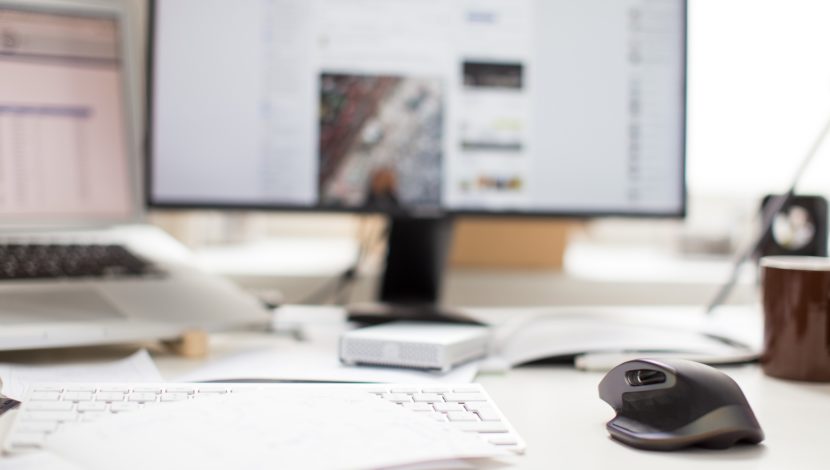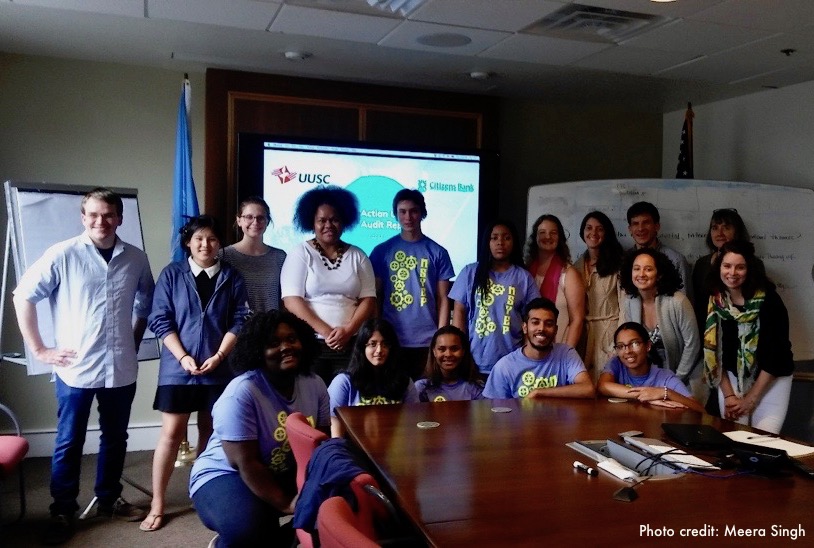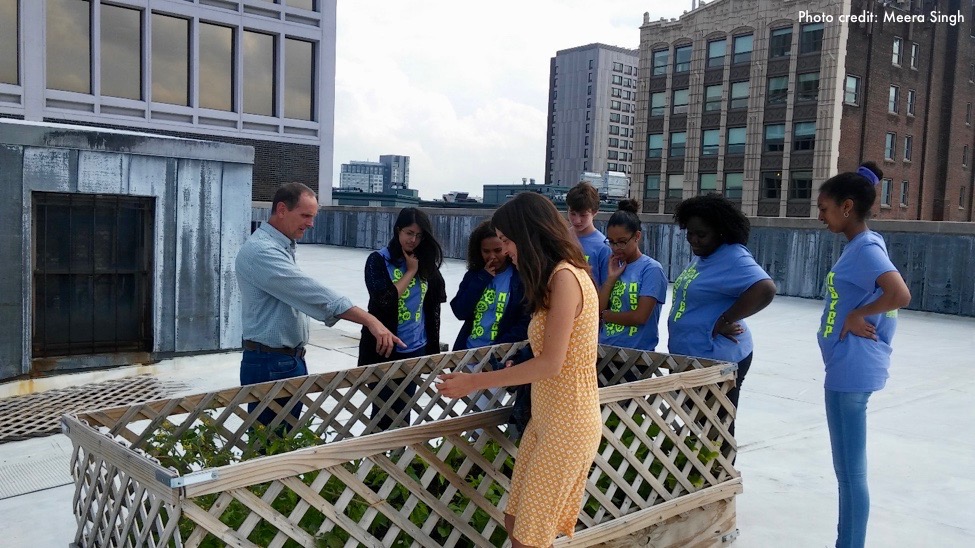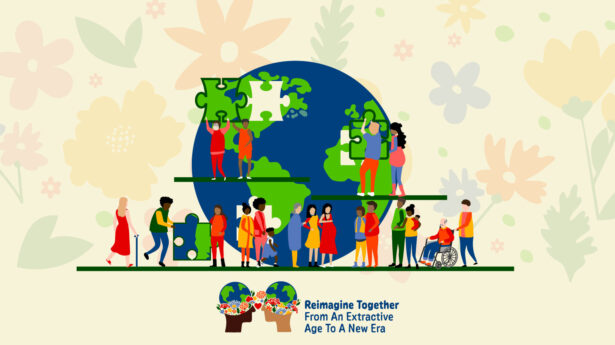The Unitarian Universalist Service Committee advances human rights through grassroots collaborations.
Promoting Sustainability at Work

By Kale Connerty on September 7, 2017
UUSC has been eco-audited! This July, we invited a youth group based in Cambridge, Mass., called the Eco-Action Team, to evaluate the energy efficiency of our office. The Eco-Action Team is made up of a group of students from the Cambridge Rindge and Latin School, as part of the Cambridge Mayor’s Summer Youth Employment Program (MSYEP), which gives high schoolers meaningful internship opportunities. The team is managed by the Cambridge branch of Youth for Earth Action, an organization that empowers young adults to get involved in the sustainability of their communities.

Environmental justice is a cornerstone of UUSC’s work and with that comes the belief in promoting accountability through sustainable practices—we wanted to ensure that we are walking the talk. According to the Eco-Action Team, buildings account for 80% of greenhouse gas emissions in Cambridge. Our building, located on Massachusetts Avenue in Cambridge, uses 54% less energy compared to similar buildings in the city. But there’s still lots of work we can do. That’s why we were so excited for this group of students to conduct their audit. Their detailed evaluations gave us insight into what our strong and weak points are with energy consumption, and their findings will also be extremely useful as we continue through the process of getting Platinum LEED (Leadership in Energy and Environmental Design) certification – the highest rating that the globally-recognized green building evaluation system awards.
Eco-audit Findings
Our building houses two other tenant organizations: Citizens Bank and Altman & Altman Attorneys at Law. The Eco-Action Team carefully examined each office using a systematic checklist and surveying individual staff members. They returned in August to present their findings, giving our building an overall sustainability score of 72.65% (not bad, but it leaves plenty of room to improve!), and identifying areas to cut down on waste.
The team broke their Report of Recommendations into specific areas of concern to give us a more detailed analysis of our office sustainability. The areas of energy use that the team evaluated were Lighting, HVAC (Heating, Ventilation, and Cooling), Office Equipment, Kitchens, Restrooms, Waste Management, and Environmental Policies.
It was good to see that the team recognized many of the steps UUSC has already taken towards sustainability, such as using Energy Star certified appliances, LED lighting, standard AC settings that minimize energy use, and bins for recycling and compost. According to their report, our most sustainable area was Lighting, and the area that needs the most improvement is Office Equipment. The recommendations they gave us were both practical and helpful. We’ve shared them below in hopes that readers can consider them for their workplaces and homes.
Our Takeaways
What made Eco-Action’s visit resonate with me was getting the chance to reconnect with one of the team members, who is heading into 11th grade and interested in studying Sociology in college. It was great to share with her about how the team’s recommendations are already having an impact in our office. Staff members were talking days later about one student’s reminder to be aware of how many disposable coffee cups we each use and to invest in reusable mugs. Personally, I’ve started getting my coffee “for here” and taking a short work session at a local coffee shop. I’ve also become more stringent about my paper towel use; I used to go for a second, even third sheet to make sure my hands were completely dry, essentially more than doubling the number of paper towels I was contributing to the waste stream.
These behaviors may seem small, and they’re things that many at UUSC already held in the back of our minds. But there was something about the Eco-Action Team’s gentle confrontation of our daily habits that drove me to make small changes, at no inconvenience to myself.
The student shared suggestions for how she has incorporated Eco-Action’s findings into her own life, like unplugging chargers and shutting off power strips at home. “Before Eco-Action, I wasn’t especially into [environmentalism]. I knew about the Paris Agreement, I knew it was important, but now it really feels like it is.” In reflection with how their work has impacted the other students, she said, “We all talked about the little things that we can do to save energy or water – just little things. I think we all agree after doing this how important it is it be practicing [sustainability] at home as well.”
For her, Eco-Action was an empowering experience: “Through Eco-Action I learned how I am able to have an impact. And, I was able to build up a leadership role and learn to work as a team.” Personally, as a teen, I was very interested in environmentalism, but these problems felt too big for me to know where to start. The issues of climate change, habitat destruction, and environmental injustice can be so overwhelming. That’s why it was so inspiring to hear the students report back on their findings, and to learn how this program has helped them engage in environmental issues.
I’ve been so fortunate to work at UUSC this summer, and I can truly say that it’s a community of conscientious, dedicated people. Although everyone at UUSC followed different paths to be here, we are all united by a desire to do good in this world. That’s a special kind of environment that you don’t see everywhere, but it’s one we hope we promote in everything we do. It’s clear that in our current political moment, we can’t count on the president or his administration to push for the environmental change that most Americans want to see. If there’s one thing to take away from the Eco-Action Team’s audit, it’s that we must start being that change we want to see, one step at a time, inspiring each other every day to work towards our goals.
On behalf of the entire UUSC staff, thanks so much to the Eco-Action Team! These students deserve to be recognized for their hard work. Their detailed report was extremely helpful to us, and their thoughtful reflections and suggestions showed that these students have bright futures ahead of them. We hope other businesses in Cambridge will take this great opportunity to evaluate their sustainability, and we hope to see a new group of eco-auditors next year!
Eco-Action Team’s Recommendations
- Optimize use of natural daylight, especially in smaller rooms with large windows, but also evaluate where using blinds can shield against solar heat gain in the summer months to minimize the demand on the air-conditioning system.
- Use indoor plants, which have been shown to have air-purification effects.
- Because different programs and tenants, like the bank, need to leave certain machines running at all times, focus on digitizing document editing and print double-sided whenever possible to improve Office Equipment energy efficiency.
- Set default energy saving options on computers and other office equipment.
- Reduce the use of single-use disposable utensils and cups, and use biodegradable or other green option single use products instead.
- Since installing hand dryers in our restrooms is currently not economically and environmentally efficient, focus on conserving paper by strategically placing eco-signage near paper towel dispensers.
- Add eco-signage near switches to remind employees to turn off lights.
- Get plumbing checked annually to prevent leaky faucets.
- Convey to building renovation contractors and the cleaning service that we prefer to only use environmentally-safe products.
- Create green teams in each office to facilitate and monitor green practices.
- Encourage tenant organizations to adopt similar eco-friendly practices.


